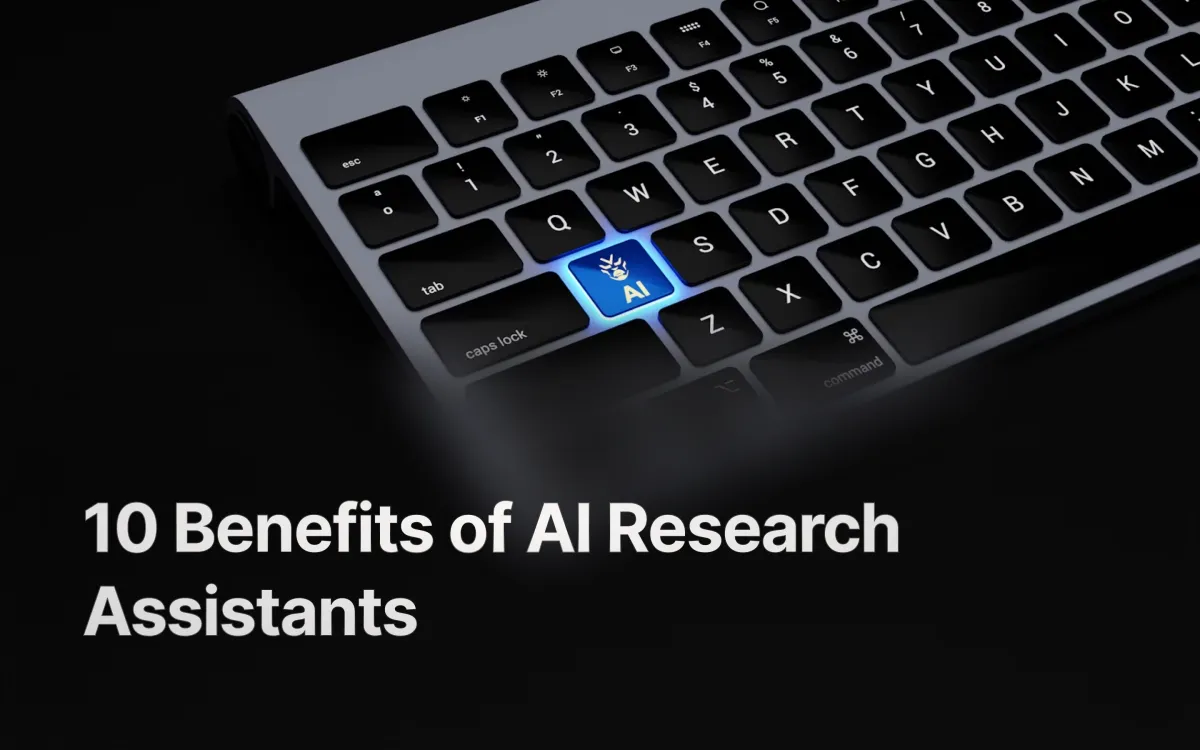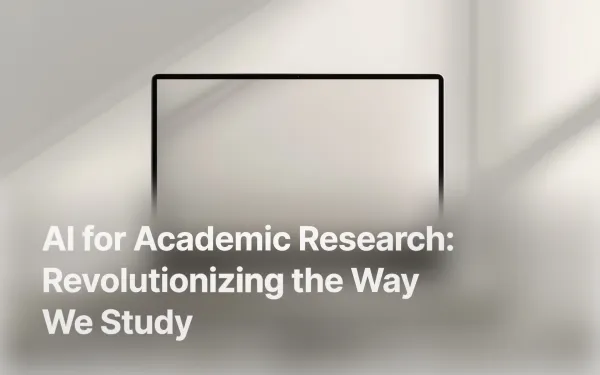10 Benefits of AI Research Assistants
Explore the 10 key benefits of AI research assistants, from speeding up tasks to improving accuracy, making research faster and easier.

Have you ever wondered how AI is changing the way we do research?
Artificial intelligence is transforming the research world by making it faster and easier to gather, sort, and analyze information. With AI research assistants, tasks that used to take hours or even days can now be done in minutes.
More and more people are turning to AI research assistants, whether in universities, businesses, or even the medical field. Professors, students, and professionals are using these tools to quickly find data, review research papers, or track industry trends.
In this article, we’ll explore the top 10 benefits of using AI research assistants.
From saving time to improving accuracy, we’ll show how AI is helping researchers work smarter, not harder.
What is an AI Research Assistant?
An AI research assistant helps people find and understand information quickly. It’s like having a digital helper that makes research faster and easier.
Instead of spending a lot of time searching through books, articles, or websites, an AI research assistant can do it for you in just a few minutes. It can also organize the information, summarize it, and suggest useful sources.
An AI research assistant can do so much more. They can analyze big amounts of data, check facts, create reports, and even find patterns in the data to give you new insights.
People in many areas are using AI research assistants, students writing papers, business people doing market research, and scientists studying data. An AI research assistant helps make research faster and simpler, saving time on both basic tasks and more complicated work.
10 Benefits of AI Research Assistants
Benefit #1: Accelerates Data Collection and Analysis

One of the biggest advantages of AI research assistants is how quickly they can collect and analyze data. In the past, gathering information from articles, books, or databases could take hours or even days.
Now, with AI, this process happens in just seconds. AI Research tools are able to scan through vast amounts of information, organize it, and make sense of it much faster than a person could.
For example, in academic research, students or professors can use AI to quickly search through hundreds of research papers to find the ones most relevant to their work. This saves a lot of time that can be better spent focusing on the actual research and writing.
In business, companies use AI research assistants to track market trends, analyze competitors, and gather data on customer behavior. Instead of manually searching for this information, the AI does it all in the background, providing quick insights that help businesses make faster and smarter decisions.
In medical research, AI assistants help doctors and scientists go through huge amounts of medical data to find patterns that could lead to new treatments or diagnoses. By speeding up this process, AI allows healthcare professionals to focus on more important tasks, like caring for patients or developing new medical breakthroughs.
Benefit #2: Enhances Research Accuracy

Another key benefit of AI research assistants is their ability to improve the accuracy of research. When humans process and interpret data, there’s always a chance of making mistakes, whether it's entering incorrect numbers, misreading information, or missing important details. AI tools, however, are designed to eliminate these types of errors by automatically handling data in a precise and consistent way.
For example, when fact-checking, AI research paper assistants can quickly scan through multiple sources to confirm whether a piece of information is correct. This helps ensure that your research is based on reliable data. Unlike humans, AI doesn’t get tired or overlook small errors, so the information it provides is often more accurate.
AI also plays a big role in data synthesis, which means combining information from different sources and making sense of it. It can organize and compare data without mixing things up or leaving anything out. This helps create a clear, accurate picture of what the data means.
When it comes to references and citations, AI research assistants can ensure that all sources are properly cited in the right format, reducing the chances of incorrect citations or missed references. This is especially useful in academic research, where accuracy in citing sources is very important.
Benefit #3: Increases Research Efficiency and Productivity

AI research assistants are great at making research more efficient and productive. One way they do this is by speeding up repetitive tasks that usually take a lot of time, such as reviewing literature or managing citations.
For instance, in a literature review essay, researchers often have to read through a large number of papers to find relevant information. This can take hours or even days. AI can quickly scan through hundreds of documents, highlight key points, and organize the information in a way that’s easy to understand. This allows researchers to focus more on analyzing the content rather than spending time finding it.
Citation management is another task that AI makes easier. When writing a paper, researchers need to make sure they properly cite all their sources. AI tools can automatically format citations and even find missing references, saving researchers from the tedious task of manually checking and formatting every citation.
There are also real-world examples where AI has significantly improved research timelines. For example, in a business setting, a company might need to analyze market trends to make decisions. Using AI, they can collect and analyze data faster, helping them make quicker, more informed choices. This efficiency leads to faster project completions and better productivity.
Benefit #4: Cost-Effective Solution for Researchers

Using AI research assistants is a smart way to save money in research. Traditional research methods often require a lot of manual work, which can be expensive. Researchers might need to hire additional help or spend countless hours doing tasks that could easily be automated by AI. This means that costs can add up quickly.
When comparing the cost of using AI research assistants to traditional research methods, the difference is clear. With traditional methods, you might have to spend money on hiring staff, printing documents, or subscribing to multiple databases. In contrast, AI tools often come with a subscription fee that is usually much lower than the costs of employing people for these tasks.
Benefit #5: Provides Access to Global Research Resources

One of the biggest advantages of AI research assistants is their ability to access a wide range of research resources from all over the world. In the past, researchers often faced challenges in finding and accessing important studies, articles, and data, especially if they were located in different countries or behind paywalls. However, AI makes it much easier to reach these resources quickly and efficiently.
AI research assistants can scan global databases, academic journals, and archives that might be hard to find manually. They can search through countless sources in seconds, helping researchers discover valuable information that they may not have been able to access otherwise.
For example, let’s say a scientist is studying climate change. An AI research assistant can help them access climate data and research from various countries, including studies published in languages they may not speak. This allows the researcher to gather a more comprehensive understanding of global trends and findings.
Benefit #6: Facilitates Collaborative Research

AI research assistants play a big role in helping researchers work together, no matter where they are in the world. With AI, teams can collaborate in real time, making it easier to share ideas, gather data, and solve problems together.
In traditional research, collaboration often involved emails back and forth, which could lead to misunderstandings or missed information.
There are many tools and platforms that use AI to enhance teamwork. For instance, project management tools like Trello and Asana have integrated AI features that help track progress, assign tasks, and remind team members of deadlines. These platforms make it easy for researchers to see who is working on what and ensure that all parts of the project are moving forward smoothly.
Additionally, AI-powered communication tools like Slack or Microsoft Teams allow researchers to chat, share files, and hold video meetings in real time. With AI, these tools can even help summarize discussions, highlight important points, and suggest follow-up tasks. This makes it easier to keep everyone on the same page and ensures that important ideas or decisions are not lost.
Benefit #7: Assists in Idea Generation and Hypothesis Testing

AI research assistants are not just good at collecting and analyzing data—they can also help researchers come up with new ideas and test their theories. By looking for patterns in data, AI can suggest innovative research directions and hypotheses that researchers might not have thought of on their own.
When researchers have a lot of data, it can be challenging to see trends or patterns. AI tools use advanced algorithms to sift through this data quickly and efficiently. For example, they might analyze past research findings and identify gaps or unexplored areas. This can spark new ideas or questions for researchers to investigate.
AI can also help in hypothesis testing. A hypothesis is a proposed explanation for a phenomenon, and researchers often need to test these ideas to see if they hold true.
AI research assistants can simulate different scenarios and predict outcomes based on existing data. For instance, if a researcher is studying the effects of a new drug, an AI tool can analyze similar cases and provide insights on potential results. This helps researchers understand the likelihood of their hypothesis being correct before they conduct actual experiments.
Benefit #8: Automates Routine Tasks (e.g., Citation, Formatting, Reporting)

One of the most significant benefits of AI research assistants is their ability to automate routine tasks that researchers often find tedious and time-consuming. These tasks, such as generating citations, formatting documents, and writing reports, can take up a lot of valuable time. By allowing AI to handle these responsibilities, researchers can focus on what truly matters—analyzing data and coming up with new ideas.
For example, creating citations is essential in research, but it can be a hassle. Researchers often have to gather information from various sources and format it according to specific guidelines. AI tools can automatically generate citations in the correct format, saving researchers from the frustration of manual entry and ensuring accuracy. This not only speeds up the process but also reduces the chances of errors in citations, which is crucial for academic integrity.
Similarly, formatting documents can be another routine task that takes up time. AI research assistants can help format papers, ensuring that they meet all the necessary guidelines for submission, such as font size, margins, and headings. This way, researchers can spend less time worrying about how their document looks and more time focusing on the content brief itself.
When it comes to report writing, AI can assist by generating initial drafts based on data and findings. This can include summarizing key points, creating charts, and even suggesting conclusions. Researchers can then review and refine these drafts instead of starting from scratch, making the writing process much more efficient.
Benefit #9: Enhances Research Accessibility

AI research assistants play a crucial role in making research more accessible to everyone, regardless of their background, language, or abilities. One of the biggest challenges in the academic world is that many research papers are written in complex language or specific technical jargon, which can make it hard for people to understand them. Additionally, language barriers can prevent people from accessing valuable information that could benefit them.
AI tools help overcome these barriers in several ways. One key feature is the ability to translate research papers into different languages. This means that a study written in English can be translated into Spanish, Chinese, or any other language, allowing more people around the world to understand and learn from the research. This is especially important in a globalized world where collaboration across borders is essential for scientific progress.
Furthermore, AI can simplify complex research texts into more understandable language. For example, some AI tools can break down complicated concepts and summarize findings in simpler terms, making it easier for non-experts or those who are new to a field to grasp the main ideas. This helps democratize knowledge and empowers more individuals to engage with scientific literature.
Benefit #10: Supports Ethical Research Practices

AI research assistants play an important role in promoting ethical practices in research. Ethical research is about conducting studies responsibly and honestly, which includes giving proper credit to others, using data correctly, and ensuring that research methods are fair and unbiased. AI tools can help researchers maintain these high standards in several key ways.
One of the primary functions of AI is its ability to detect plagiarism. Plagiarism happens when someone uses another person's work or ideas without giving them credit, which is not only unethical but also can damage a researcher’s reputation.
Additionally, AI tools assist researchers in ensuring ethical data use. This means using data responsibly and in ways that respect privacy and consent.
AI also helps researchers comply with established research standards. Many disciplines have specific guidelines on how research should be conducted and reported.
AI tools can assist in reviewing methodologies to ensure that they meet these standards. By analyzing research designs, AI can help identify potential biases or flaws in the methodology that could affect the study’s outcomes. This is especially important because biased research can lead to incorrect conclusions and can harm the integrity of the scientific process.
Conclusion
AI research assistants offer several key benefits that are transforming the research landscape. They accelerate data collection, enhance accuracy, and increase efficiency, allowing researchers to focus on critical analysis.
Now is the perfect time to explore AI research tools for your projects. Whether you’re a student or a professional researcher, using AI can lead to better outcomes and enhance your research experience!
To take your research to the next level, consider using v0 Report, an AI-powered tool designed to streamline your report generation and enhance your research efficiency. Discover how v0 Report can transform your workflow today!
Frequently Asked Questions
1. What is an AI research assistant?
An AI research assistant is a computer program that helps researchers gather, organize, and analyze information. It can quickly process large amounts of data, find relevant articles, and even check for errors. This makes research faster and easier.
2. How can AI research assistants improve the accuracy of my research?
AI research assistants can reduce mistakes by checking data and references. They can identify errors in your work, ensuring that your information is correct and reliable. This helps improve the overall quality of your research.
3. Are AI research assistants expensive to use?
Answer: Many AI research assistants are designed to save money by reducing the need for manual work. While some tools may have a cost, they can help lower research expenses in the long run by making the process faster and more efficient.
4. Can AI research assistants help with collaboration among researchers?
Yes! AI research assistants can facilitate collaboration by allowing researchers from different places to work together in real-time. They can share information and ideas easily, making teamwork more efficient and effective.



